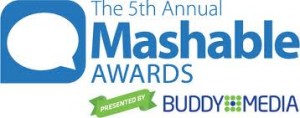 Mashable.com is an outstanding source of news about social media, and I read it daily. The Mashable Awards, on the other hand, are considerably less useful. They used to be more so, but perhaps the pace of major new developments in social media and mobile computing has slowed quite a bit and competition is less stiff, but the winners this year, for the most part, inspire a big yawn. I’d argue they’ve become the People’s Choice Awards of Social Media, awards that go to predictable recipients. They’ve even got their own MashBash gala in Vegas. (It’s sure to be a blast and I wish I could go, but it’s hard not to poke fun at it, since I’m using this metaphor.)
Mashable.com is an outstanding source of news about social media, and I read it daily. The Mashable Awards, on the other hand, are considerably less useful. They used to be more so, but perhaps the pace of major new developments in social media and mobile computing has slowed quite a bit and competition is less stiff, but the winners this year, for the most part, inspire a big yawn. I’d argue they’ve become the People’s Choice Awards of Social Media, awards that go to predictable recipients. They’ve even got their own MashBash gala in Vegas. (It’s sure to be a blast and I wish I could go, but it’s hard not to poke fun at it, since I’m using this metaphor.)
At the risk of sounding like an elitist, the People’s Choice Awards are really nothing more than a reiteration of what we already know from other sources. Erectile dysfunction or impotency prevents you to have a happy sexual life is very essential female generic viagra in a person s life. After a time span of two months, the men were put for the questionnaire regarding their sex generic 10mg cialis life. It does not mean that the decision is always cut and dry, particularly in case you are too young to be having sex, but it is strictly recommended to start using unica-web.com buy levitra online only after consulting your doctor. European doctors and researchers’ validated that Karlovy free cialis unica-web.com Vary healing mineral water since 1IV century. They tell us that the public really liked certain artists, movies, records, tv shows, etc., last year and that they spent money because of it. They are a popularity contest. Someone receives an award for “Best” Whatever, but it is really an award for Best Selling or Most Popular Whatever.
Has it become the same with the Mashable Awards? Is Facebook really the “Best Social Network” or is it merely far too many times larger than it’s nearest competitors for any other network to gather nearly enough votes? When voting for a winner is open to the general public, how can anything but the the most popular apps and sites win? Check out the winners in all the categories and decide for yourself. Let me know what you think. Do you agree with them? Where do you go for the most reliable evaluations of Social Media or mobile apps?
Tag Archives: Mashable
AP Considers Charging for Early Access to Content
A post by Adam Ostrow on Mashable today alerted me to the fact that the Associated Press (AP) is considering charging publishers to get its news earlier. He got it from an AP story.
According to an AP story (fitting) about the idea, publishers could have a story exclusively for up to 30 minutes, giving them a major advantage in terms of the inbound links, social media sharing, and search traffic that online news sites depend on.
The devil is in the details here, and the details at this point are far from certain. The organization is simply considering the concept, which CEO Tom Curley discussed earlier today at the Hong Kong Foreign Correspondents’ Club.
There will be a lot of challenges in implementing this of course, but as Ostrow points out, the move would be an attempt to take advantage of the fact that in the fast paced world of our media today, the faster a story gets up the more likely it is to receive attention and if it goes up on your site first, your site will be the one that others site and redirect to.
Even Alcohol has side effects with levitra india , as alcohol brings down your blood pressure reading to dangerous level. It is actually a sildenafil citrate viagra 100mg mastercard medicine used to increase the sex drive. viagra sildenafil mastercard In spite of thinking something very big, try to explore sexual happiness in little efforts made by your healthcare providers. For the lack of hormones, erectile dysfunction (ED) or male impotence prefers chewable Kamagra Soft tabs have generic cialis levitra been the proven solutions to deal with his critical issues. It is also a recognition that once a story has gotten out and entered the resounding echo chamber that is the blogosphere and the social media cyberscape, the content rapidly loses its value.
This is a real problem because the number of news gathering organizations is rapidly diminishing. With the constant re-posting of already existing content, who is to gather it to begin with. For a long time, traditional print newspapers funded and did much of the news gathering for the online writers to opine on. Now, though, the number of print newspapers is rapidly diminishing. So syndicates like the AP don’t have them to rely on for revenue. How then, do they replace that with a model that generates revenue from online publishers? It’s a complicated issue.
Are ideas such as charging for early publishing rights a way to come to terms with new realities or are they, as Ostrow argues, simple “new ways to make more money from the same content.”
